|
|
 |
It's just a hop and a skip from Prince Rupert to Digby Island. The bay is shoal, with just a small pool deep enough for mooring; we watch range markers carefully on our way in. We arrive in the soft gray twilight of the north coast and raft up (tie Full Moon alongside another vessel as there are no empty spaces on the dock). We are always careful to select a suitable boat for rafting up -- preferably one that looks a bit rougher than we do! The shore is lined with old boat sheds, reminders of the glory days when Dodge Cove was a shipbuilding town. |
|
|
|
|
|
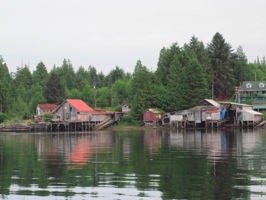 |
Most of the old sheds are showing their age... |
|
|
|
|
|
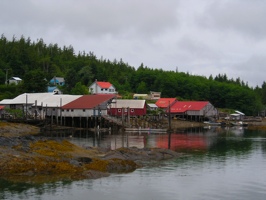 |
... but some seem to be maintained still. We are sorting ourselves out when a young fellow in a canoe paddles over to speak to us. He tells us that Full Moon has been sighted and recognised by some of the older folks ashore; his conversation is so sprinkled with first and second cousins, second marriages and exes and in-laws and step-relations, that I'm completely lost after fifteen minutes! But the gist is that he's only about two degrees away from Jon and Full Moon; his parents' generation knew Kenny and Ray -- and Malcolm, and he and Jon have several acquaintances in common. We inquire after the lady whom Malcolm loved and lived with when he worked here, and are told that, sadly, she is hospitalised and not doing well. |
|
|
|
|
|
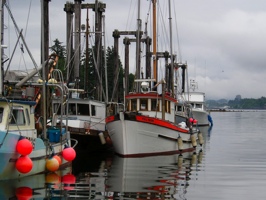 |
It's nice to be met by a welcoming committee :-) our young friend tells us how to find the present owners of the old Wahl Brothers yard, how to find Malcolm's old friend Norman Iverson, where to look for an Internet Access Point, and so on. After treating him to coffee and cookies we wish him a very good evening and I settle down to the novel project of cleaning and canning most of 3 whole coho. As I struggle with an inadequate fileting knife and my own vast ignorance, I cannot help hearing Malcolm's impatient growl in my ear, telling me just how wrong I'm doing it. It's a long and frustrating process but finally I have several sealed jars of salmon, and with relief chuck the skeletons overboard. |
|
|
|
|
|
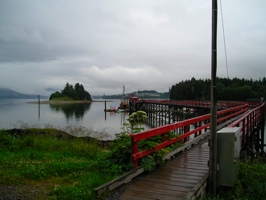 |
We take a brief walk on shore, with the intent of doing some serious visiting the following day. The government dock is in good condition, and proximity to Rupert means it's still seeing frequent use. It hasn't -- like far too many others -- been sold off to private owners. A friendly wharfinger comes by in the morning and asks us almost apologetically for moorage: eighteen dollars, she says, but she really doesn't like it that they're supposed to charge these days, and she'll accept fifteen, or whatever we think is fair. We pay our $18 happily and I reflect that I like the people in these parts. They seem informal, tough, self-reliant, and full of sturdy commonsense rather than petty officiousness. Nice people. But oh, the climate... |
|
|
|
|
|
 |
This sign puzzled me at first, until Jon explained that "quad" is Canadian for "ATV" or "mini 4x4". On the smaller islands many people get around on these little gas-powered microtanks; many roads are unpaved and/or in rough condition. |
|
|
|
|
|
 |
At the head of the dock, the community bulletin board and official town sign welcomes us to Dodge Cove. We read the notices with interest; you can tell a lot about a place from what's tacked up on the public bulletin board. The village has something of a local reputation as an art colony; several painters live here, trying to show and sell their work in the little "tourist town" in Rupert. |
|
|
|
|
|
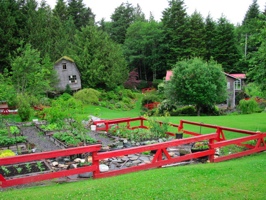 |
At the head of the dock is a very handsome house and garden, belonging to one of the more prosperous residents... |
|
|
|
|
|
 |
... whose landscaping notions include a small whale skull. |
|
|
|
|
|
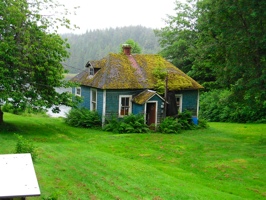 |
We saw several houses falling into ruin; Jon particularly liked this one and said it was a shame. Despite its condition it seemed to be inhabited (!), or perhaps just camped in. |
|
|
|
|
|
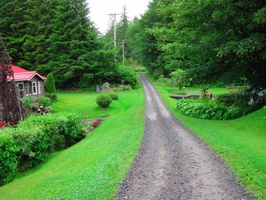 |
This is the main road in Dodge Cove: most inviting. The lush greenery -- in mid July -- reminds me that we are in temperate rain forest, the northern jungle. I'm reminded vividly of childhood walks in England; a nostalgic and almost disorienting feeling. |
|
|
|
|
|
 |
As with most of the smaller islands, bits of abandoned machinery lurk in the undergrowth here and there. |
|
|
|
|
|
 |
The road is irrestible; we want to walk just a little further, and just a little further. It beckons like the road in a fairy tale, promising something wonderful around the next bend. What we find in fact is a decaying schoolhouse, which we attempt to enter without success, and a clean and modern community centre with (indeed) an internet access point and a tiny town museum. |
|
|
|
|
|
 |
I also find a close relative of the Coastal California Banana Slug! |
|
|
|
|
|
 |
The next day (July 16) we go visiting. First we visit Norman Iverson, legendary boat builder and probably Malcolm's favourite person; certainly he spoke with more warmth and admiration of Norman than of anyone else we can remember. We find Mr Iverson in his workshop building a Whitehall rowboat; we bring him some Full Moon wine and talk to him a while about Malcolm's Digby Island days. He's a most pleasant man, soft-spoken and almost alarmingly competent; the big boatshed in which we stand he built with his own hands, and not all that long ago. From that visit we walk back down the road to find the new owner of the old Wahl yard (shown here). |
|
|
|
|
|
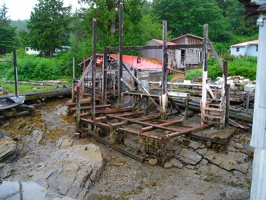 |
When we knock on the door of Karen Prosser's house she regards us initially with consternation. [Later we realise that her husband and daughter are at sea fishing, and a knock on the door from slicker-clad strangers could mean bad news.] I talk fast, telling her about Full Moon and Malcolm, why we're here; she warms up to us and despite other priorities in her day, makes time to take us down to the old Wahl yard, and we tell her stories about Malcolm. This is the tidal grid (on which boats are situated at high tide, propped and tied upright, so that as the tide falls they can be worked on). |
|
|
|
|
|
 |
This gives you some idea of the tidal variation at this latitude, which can reach 20 feet at times; at high tide this dock will be floating much nearer the top of those pilings. They need to be that tall. |
|
|
|
|
|
 |
It must have been a grand old shop at one time but half the roof is gone now. |
|
|
|
|
|
 |
The general impression is of busy chaos... |
|
|
|
|
|
 |
... almost as if work were still in progress. |
|
|
|
|
|
 |
Some wonderful old tools, even balks of timber, are lying about... |
|
|
|
|
|
 |
... as if everyone had just walked off the job one day and forgotten to return. But the layer of dust everywhere tells us how long the boatwrights have been gone. While Ms Prosser tells us about her family's involvement with the Wahls and the shop, I scatter a little of Malcolm's ashes about, in places where he would have stood and walked many, many times. Here he made spars (masts and trolling poles) for the Wahl boats; he was also night watchman, camping out in the boatshed, first to get up in the morning and open up the shop. |
|
|
|
|
|
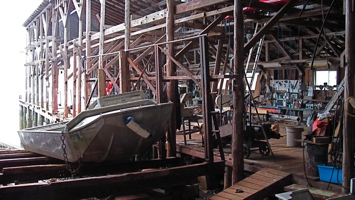 |
Full Moon probably sat on these ways as she was built. [A history of the Wahl yard has recently been published by grandson Ryan Wahl; Full Moon appears in the book, but only as an example of their classic canoe stern.] I try to imagine the place roaring with activity, several boats in progress at the same time... I could spend all day here, but Ms Prosser has things to do and places to go. We take a few lingering last looks at the old shop, scatter some more of Malcolm's ashes near the tidal grid, and take our leave thanking our hostess sincerely for her time and trouble. We give her some Full Moon cider, which puts a smile on her face. She's off to join the rest of the family for the fishing, while the season lasts. |
|
|
|
|
|
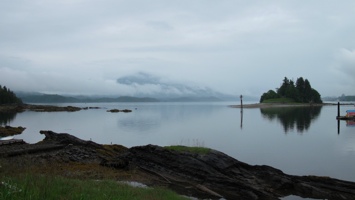 |
it's lunchtime and we plan to be on our way to Lewis Island soon; I start a salmon chowder with some of the freshly canned fish. We eat our lunch on deck enjoying a brief dry spell and a sombre but lovely view. |
|
|
|
|
|
 |
It is odd to think of Full Moon being launched here -- fresh and brand-spanking-new -- fifty years ago. (Perhaps fifty years ago almost to the day; we don't know when she was completed.) It's odd to think how many times she tied up here in her working years. Ashore we met Bill Smith, an old friend of Malcolm's, who said what others have also said: when they saw Full Moon come in, they found themselves looking for Silver Tide -- where one was, the other would not be far behind. |
|
|
|
|
|
 |
I think both of us are affected by the sobering reminder of time, age, mortality, the slow attrition of people and ships and the decline of the coast. We can't help thinking what Dodge Cove must have been in the 50's when Full Moon was launched: a prosperous, busy, bustling little town with its own school, a thriving community, the bay full of boats and skiffs. Now it's a ghost town. The atmosphere is sombre, moody, reflective (in more senses than one). The proper music for this landscape is a Celtic lament, for Uilleann pipes. |
|
|
|
|
|
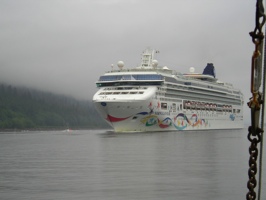 |
We leave Dodge Cove as carefully as we entered, with all eyes on the range markers. Out in the channel between Rupert and Digby, in waters that Malcolm navigated countless times in Chilco and earlier boats, I scatter the last of his ashes; it feels like the last goodbye. I miss the old man sorely; he knew so much, there was so much more I could have learned from him. (He would have reminded me to use more salt when canning salmon, so the fish would be firmer; it came out too soft for eating and was useful only for soups and spreads.) On our way south again we see the new face of the north coast: a plug-ugly, useless, hyperconsuming kindergarten of a cruise ship, larger than an office building, dominating the landscape. It might as well be an alien spaceship in its sheer bloody irrelevance. |
|
|
|
|
|
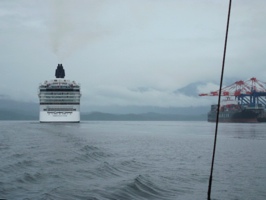 |
Ugh -- we are glad to leave the Thing behind us and head South. |
|
|
|
|
|
 |
This may be the same Chinese bulk carrier we saw in Rupert... now loading up with wheat. They seem to be filling her aft to fore, as she's almost on her lines astern and way high by the bows...
We consider staying at Oona River again tonight, but I have a yen to see the little string of islands just north of Oona River on the coast of Porcher. I thought we might try the anchorage by McMicking Island; it looks interesting on the chart. For the first time on the trip I chart my own course (with Jon looking over my shoulder) and take us inside the island group; but we don't like McMicking in person, and continue down Arthur Passage to a decent little anchorage on Lewis Island (Lawson Cove) with a view of the main channel. Lewis Island is where Norman Iverson first met Malcolm, and we've recently heard that story; so perhaps it's the right place to be tonight. We're tired and the salmon chowder (cooked underway on the diesel heater) is good; hard rain is splatting down on the decks and we can't stay awake long. Tomorrow we'll head for Banks Island, the jumping-off point for crossing Hecate Strait. |
|
|
|
|
|